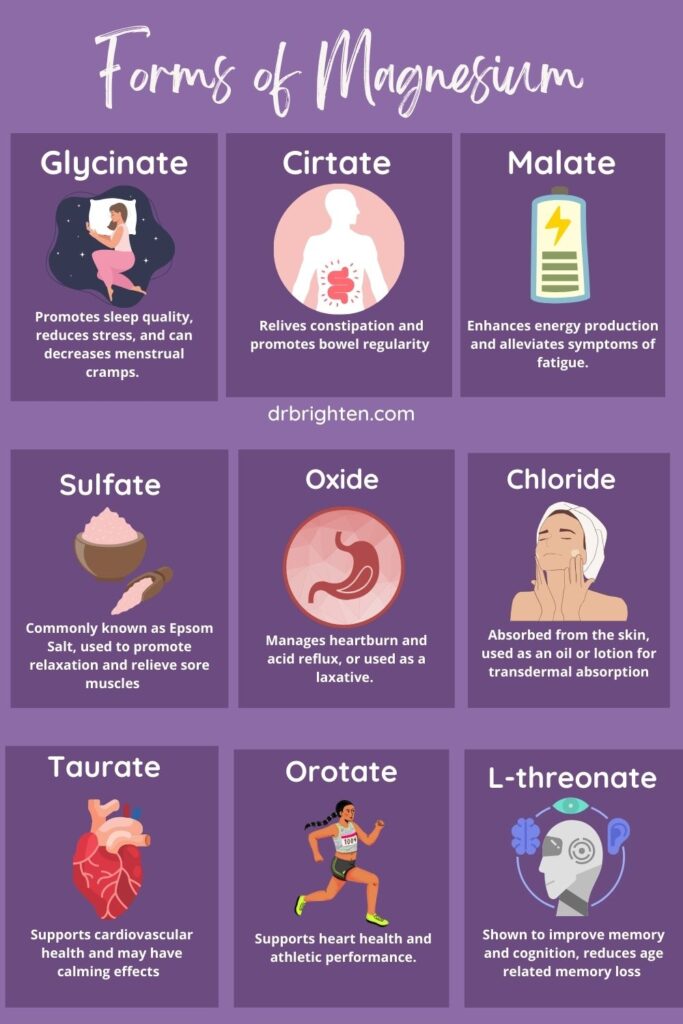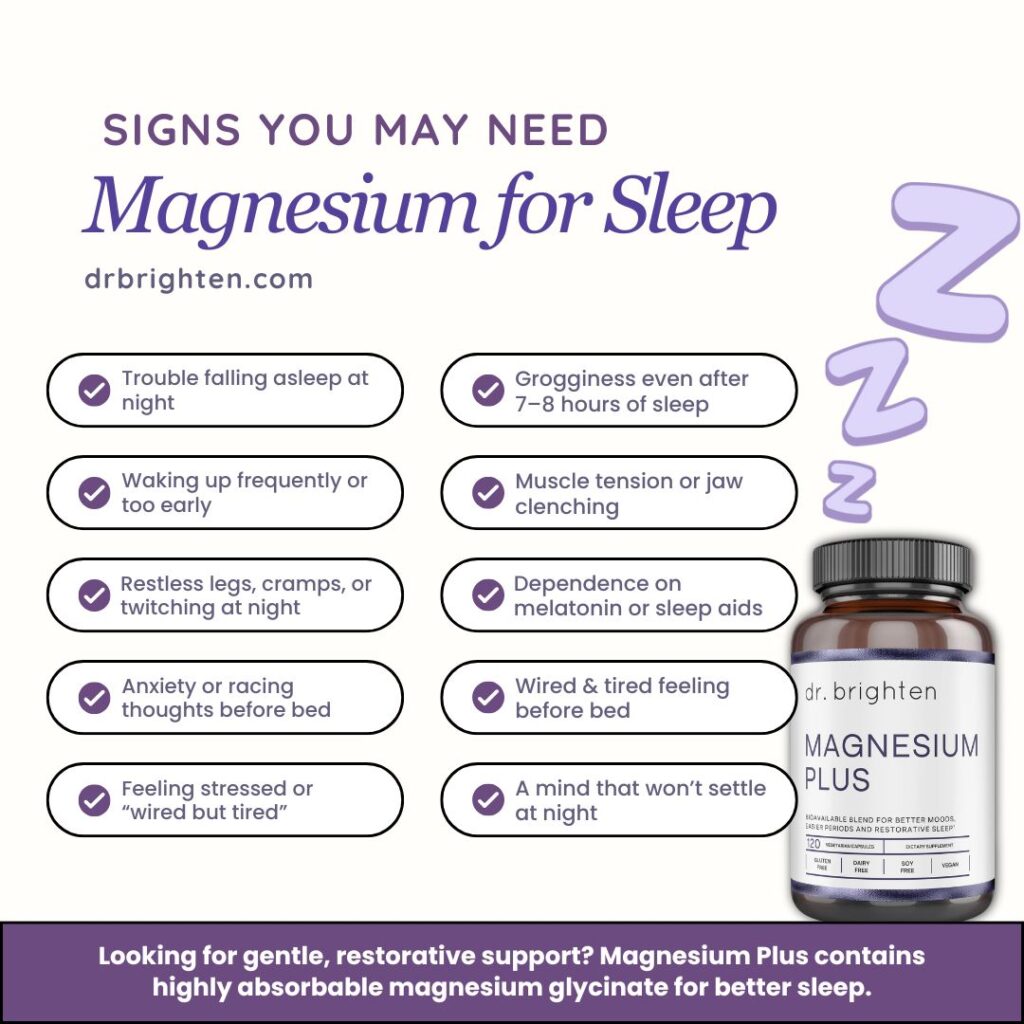If you struggle with falling asleep, staying asleep, or waking up groggy, you’re not alone. In fact, research suggests that up to 60% of adults don’t get enough magnesium, and low levels of this essential mineral are strongly linked to poor sleep quality.
Magnesium isn’t just a mineral for muscles and energy — it’s one of the body’s most powerful natural relaxants. By calming the nervous system, balancing stress hormones, and supporting melatonin production, magnesium helps your body transition from “fight or flight” into “rest and digest.”
As a natural relaxant, magnesium helps to calm the nervous system1, ease tension, and prepare your body for sleep, all without the need for sedatives or sleep aids. In fact, using magnesium for sleep is one of the most science-backed2 and gentle ways to improve both sleep quality and duration.
The best part? Magnesium works with your body’s own relaxation pathways and may support sleep quality. In this guide, we’ll explore exactly how magnesium supports restful sleep, which types are best, how much to take, and the timing that makes all the difference.
In this article, we’ll explore:
- Why magnesium matters for sleep
- The best types of magnesium to take (and which to avoid)
- How to combine magnesium with other nutrients for better results
- The ideal dosage and timing
- And how to choose the right magnesium supplement for you
TLDR: Magnesium for Sleep
- Magnesium supports sleep by calming the nervous system, relaxing muscles, balancing cortisol, and boosting natural melatonin.
- Best forms for sleep: Magnesium glycinate, bisglycinate, and threonate (gentle, well-absorbed, calming).
- Avoid for sleep: Magnesium citrate (more of a laxative), oxide (poorly absorbed, but may be used as an additional buffer in a formula, so not always bad as an addition).
- Best dose: 200–400 mg of elemental magnesium daily, taken consistently.
- Best time: 1–2 hours before bedtime.
- How long it takes: Some notice benefits in days; full effects build over 2–4 weeks.
- Works well with: Zinc, melatonin (short term), L-theanine, and ashwagandha. Check out my Adrenal Calm formula for a combination effect.
- Side effects: Higher doses or certain forms may cause loose stools; glycinate/bisglycinate are gentler.
- Food sources: Pumpkin seeds, spinach, nuts, beans, avocados, bananas, dark chocolate, salmon, yogurt.
Benefits of Magnesium for Sleep
Magnesium—the fourth most plentiful mineral3 in the body—is not just involved in muscle and nerve function, blood sugar regulation, and bone health. It also helps to support the parasympathetic nervous system, your “rest and digest” mode, in several key ways.
When your parasympathetic nervous system is activated, your heart rate slows, muscles relax, and your brain is better able to shift out of stress mode and into sleep. Overall, magnesium has calming effects, which is why it's useful for unwinding and getting better rest.
Here's a closer look at the main benefits of magnesium for sleep:
1. Relaxes Muscles and Eases Tension
Magnesium helps regulate calcium flow in muscle cells4, allowing muscles to contract and then properly relax. This helps reduce nighttime cramping, tension, and restlessness, making magnesium especially helpful for people with nighttime muscle tension and restlessness.
2. Enhances Sleep Quality and Duration
Some studies5 have found that taking magnesium before bed can help adults fall asleep a bit faster and get more rest overall.
For example, findings from one study6 demonstrated that magnesium (in this case, mag L-threonate) improved sleep quality, especially deep/REM sleep stages (the most restorative phases of the sleep cycle), and improved mood, energy, alertness, and daily activity and productivity.
A longitudinal study from the CARDIA cohort7 (which included nearly 4,000 participants) found that higher magnesium intake was modestly associated with better sleep quality and significantly linked to reduced risk of short sleep duration (less than 7 hours). Participants in the highest magnesium intake group were about 36% less likely to experience short sleep compared to those with the lowest intake.
3. Supports Melatonin Production
Magnesium is involved in the synthesis of melatonin, your body’s primary sleep hormone that's normally produced at night. Melatonin helps regulate your circadian rhythm and signals to the body that it’s time to wind down and prepare for sleep.
4. Calms the Mind and Reduces Anxiety
Magnesium helps regulate GABA (gamma-aminobutyric acid), a neurotransmitter that promotes calmness by reducing neural excitability.
GABA is critical for reducing anxiety and racing thoughts that can interfere with falling or staying asleep, which helps to explain why magnesium has been shown to support emotional regulation.
Related: ADHD and Anxiety: How to Tell the Difference and What to Do About It
5. Balances Cortisol and Stress Hormones
Chronic stress and elevated cortisol levels are well-known culprits of insomnia and sleep disruption. Magnesium helps buffer the effects of stress8 by reducing HPA axis hyperactivity (the stress response system) and keeping cortisol levels in check.
Related: Can Stress Cause a Hormone Imbalance?
6. Can Help Manage Menopause Symptoms
Magnesium during menopause, including from foods as well as supplements, has many benefits, not to mention for maintenance of bone mineral density. It may support mood, sleep quality, and overall well-being during menopause..
Related:
Magnesium Benefits: 15 Ways This Mineral Boosts Health
Which Hormones Affect Sleep? The Hormone-Sleep Connection Explained
Why Magnesium Deficiency Can Disrupt Sleep
Low magnesium levels are surprisingly common, particularly among adults who are chronically stressed, consume processed foods (that lack natural minerals), and those who take medications like diuretics or proton pump inhibitors, which can deplete magnesium.
In fact, some estimates suggest that about 45% to 60% of people in the U.S.9 and Europe are lacking enough magnesium, mostly due to low intake from their diets.
Symptoms of magnesium deficiency10 that can negatively affect sleep include:
- Trouble falling or staying asleep
- Muscle cramps or twitching
- Restless legs or numbness in the legs
- Anxiety or irritability
- Waking up frequently during the night
Replenishing magnesium, especially with the right form, can significantly improve sleep for many people—and fortunately, it's inexpensive and easy to do.
Related: Why Can’t I Sleep? The Real Reasons for Perimenopause Sleep Issues (and What Actually Helps)
What Type of Magnesium Is Best for Sleep?
There are several types of magnesium11, and each works a bit differently in the body. Here’s a breakdown of the most relevant ones for sleep:
Magnesium glycinate:
This is one of the most effective forms for sleep. It’s bound to glycine, an amino acid that also promotes calm and relaxation. A magnesium glycinate supplement for sleep is gentle on the stomach and excellent for those with stress-related insomnia. It also helps support a calm mind and is ideal for soothing racing thoughts and mind chatter. This is the form of magnesium that you'll find in my Magnesium Plus formula.
Magnesium threonate:
Known for crossing the blood-brain barrier, magnesium threonate for sleep can help improve brain function and calm a racing mind. It’s ideal for people whose insomnia is driven by mental overactivity, as it promotes calm and helps quiet a busy mind.
Magnesium bisglycinate:
A close relative of glycinate, magnesium bisglycinate offers similar benefits and is often used in higher-quality magnesium powder for sleep blends.
Magnesium citrate:
While common, mag citrate has a laxative effect and is better for digestion than relaxation. It's usually taken at night to promote regularity and help prevent or treat constipation.
Magnesium oil for sleeping:
This type is applied topically; it can sometimes help to relieve muscle tension, but is less effective for deep, restorative sleep compared to internal forms.
Magnesium gummies for sleep:
Magnesium gummies for sleep are a convenient option, especially for those who dislike swallowing capsules. They often contain calming co-nutrients like L-theanine or herbs such as chamomile.
While effective for mild support, the dosage in gummies is typically lower than capsules or powders. Be sure to check the magnesium form (glycinate and bisglycinate are better absorbed than oxide or citrate) and watch for added sugars. These aren’t ideal at bedtime because of the sugar content and potential to promote dental decay. Take before you brush your teeth for the night.
Magnesium drink for sleep:
A warm magnesium beverage before bed can double as a relaxing ritual. You can stir magnesium powder, such as citrate, into warm oat or almond milk, and if you'd like, add some turmeric and cinnamon for additional anti-inflammatory and digestive benefits.
So what type of magnesium is best for sleep? For most people, magnesium glycinate is the top choice. It's well-absorbed, calming, and supports GABA levels without digestive upset.
Magnesium Powder for Sleep:
Magnesium powder can be stirred into warm water or milk, creating a soothing bedtime drink. Magnesium citrate is the most common powdered form and can also support digestion.
This option works well as part of a nightly relaxation ritual, but higher doses of citrate may have a laxative effect. For those seeking deep, restorative sleep, powders with glycinate or bisglycinate are often preferred.
Related: What's the Best Magnesium Supplement? Read this to understand other benefits of magnesium and what makes the best magnesium supplement for you.
Comparison of Magnesium Forms for Sleep
| Magnesium Form | Absorption | Best For | Sleep Benefits | Potential Drawbacks |
| Magnesium Glycinate | High | Stress-related insomnia, general use | Calms nervous system, supports GABA, gentle on stomach | May be more expensive than basic forms because it is a better absorbed formulation with less potential for digestive upset |
| Magnesium Threonate | Moderate (crosses blood–brain barrier) | Anxiety, racing thoughts, cognitive health | May improve deep/REM sleep, supports brain function | Very costly; less magnesium per dose |
| Magnesium Bisglycinate | High | Sensitive digestion, long-term use | Similar calming benefits as glycinate; gentle on stomach | May be harder to find, but superior absorption |
| Magnesium Citrate | Moderate | Sleep + digestion support | Can ease constipation, promotes relaxation | Laxative effect in some; less calming than glycinate |
| Magnesium Oil (Topical) | Variable (skin absorption debated) | Muscle tension, localized cramps | May relieve muscle tightness and restlessness | Limited systemic sleep effects; can cause skin irritation |
| Magnesium Gummies | Moderate (depends on form used) | Convenience, mild support | Easy to take, often combined with herbs like L-theanine | Lower dosage; added sugars or fillers; label dose may not be accurate |
| Magnesium Drink (Powdered Mix) | Moderate | Bedtime ritual, hydration | Relaxing routine; may combine with herbs/spices for added calm | Form matters (citrate can cause loose stools); flavoring/sweeteners; may have bad taste |

How To Take Magnesium for Sleep: Dose of Magnesium for Sleep
Knowing how to take magnesium for sleep can make a big difference in how effective it is. Here are some tips:
- Best time to take magnesium for sleep: Take it 1–2 hours before bedtime, especially if taking a type like magnesium citrate. This allows your body time to absorb and begin utilizing it.
- Dose of magnesium for sleep: Most people do well with 200–400 mg of elemental magnesium. Always start on the lower end and increase gradually in order to monitor how you respond to different amounts. Taking too much can potentially cause loose stools, so start low and slow.
- How much magnesium for insomnia? Studies suggest doses of 300–400 mg can improve sleep quality and reduce sleep latency (how long it takes to fall asleep), especially when used consistently. Your body uses magnesium on a consistent basis, so you need to replenish your intake often (such as daily) for the greatest benefits.
Always check the elemental magnesium amount on the label (not just total compound weight), and speak with a health provider if you’re taking medications or unsure about how much magnesium to take, including for sleep.
How to Take Magnesium for Sleep: Step-by-Step
- Choose the right form: Magnesium glycinate or bisglycinate are gentle and calming.
- Check the elemental dose: Look for 200–400 mg of elemental magnesium (not compound weight) for sleep support.
- Take it 1–2 hours before bed: This timing helps your body absorb magnesium and shift into relaxation mode as bedtime approaches.
- Start low and increase gradually: Begin with 150–300 mg daily, then adjust upward if needed, to avoid digestive upset. If you opt for citrate, it may need to be lower to avoid diarrhea.
- Pair with calming nutrients: For deeper relaxation, combine magnesium with zinc, vitamin B6, L-theanine, or adaptogens like ashwagandha, like you’ll find in my Adrenal Calm formula.
- Stay consistent: Magnesium works best when taken daily, since your body uses and depletes it regularly.
- Stay hydrated: Take magnesium with water or a calming evening drink to improve absorption and reduce the chance of side effects.
The NIH sets a Tolerable Upper Intake Level (UL) for supplemental magnesium at 350 mg/day for adults. Some clinicians use higher intakes. Work with your provider if considering doses above the UL.
Who should talk to a clinician: kidney disease, on diuretics/PPIs, taking antibiotics or muscle relaxants, pregnant/breastfeeding.
How Long Does it Take for Magnesium to Work for Sleep?
You may notice benefits within a few nights of taking magnesium for sleep, especially if you’re magnesium-deficient. However, for full effects, such as for deep sleep and cortisol regulation, give it at least 2–3 weeks of consistent use.
Some people experience better results over time as their magnesium stores are replenished. It's possible you won't experience the sleep benefits of magnesium unless you consistently take it for about 4 weeks or longer.

Zinc and Magnesium for Sleep
Zinc and magnesium are two minerals that work together to support sleep and overall nervous system health. Both play a role in regulating neurotransmitters and hormones that influence relaxation and circadian rhythm.
Zinc supports hormone balance and nervous system function. Taking zinc and magnesium before bed can help to improve sleep quality12, especially in perimenopausal, high stress, and insomnia. Zinc supports immune balance and hormone regulation, while magnesium calms the nervous system and reduces cortisol levels.
Taken together before bed, zinc and magnesium can promote deeper rest, reduce nighttime awakenings, and support recovery after stressful days. This combination is often included in high-quality sleep support supplements.
Magnesium and Melatonin
Melatonin is the body’s primary sleep hormone, while magnesium helps the body naturally produce and regulate melatonin. When taken together, magnesium and melatonin may work synergistically to improve sleep onset and quality.
While magnesium supports natural melatonin production, some supplements combine magnesium and melatonin13 for extra support in falling asleep. Melatonin is best used on a short-term basis for most people, while magnesium can be used daily and long-term.
Some people benefit from short-term use of melatonin to reset circadian rhythms (such as during travel or after late-night shifts), while magnesium can be taken daily long-term. Magnesium supports GABA activity and stress reduction, helping melatonin work more effectively.
Supplements that combine magnesium and melatonin may be especially helpful for those with difficulty falling asleep, though melatonin is best reserved for short-term use.
Magnesium and Ashwagandha
Magnesium and ashwagandha are a powerful pairing for better sleep. Magnesium calms the nervous system and reduces nighttime restlessness, while ashwagandha is an adaptogenic herb shown to balance cortisol and support resilience to stress.
Both magnesium and ashwagandha (an adaptogenic herb) can help with sleep and stress14, and combining them may work better than taking either one alone.
Ashwagandha has numerous benefits if you're fatigued or stressed, including supporting a healthy stress response, cortisol balance, energy, mental clarity, and restful sleep.
Other helpful nutrients to consider combining with magnesium include L-theanine, glycine, vitamin B6, passionflower, and calming adaptogens such as valerian. You’ll find this combination in my Adrenal Calm formula, which is the ultimate supplement to support better sleep.
For more guidance on these and other sleep supplements, check out: 10 Best Sleep Supplements Besides Melatonin
Magnesium for Sleep Side Effects
While magnesium is generally well-tolerated and safe for most people, it’s still important to be aware of potential side effects. If you’re taking higher doses or using certain forms, you might be more likely to experience adverse effects such as indigestion.
Common magnesium side effects can include:
- Higher intakes of certain forms (especially citrate) may cause loose stools. Glycinate/bisglycinate are typically gentler.
- Drowsiness if taken during the day
- Low blood pressure or dizziness in those who are sensitive
These effects are typically mild and can often be avoided by choosing gentler forms like magnesium glycinate or magnesium bisglycinate, which are typically easier on the stomach and less likely to cause laxative effects.
To minimize side effects, start with a lower dose (100–200 mg), take it in the evening, and stay well-hydrated. If you have kidney disease or take medications that affect magnesium levels, consult your doctor first.
Magnesium-Rich Foods for Sleep
Before turning to supplements, or in addition to using them for extra support, consider getting more magnesium through your diet naturally. Magnesium is found in foods including:
- Pumpkin seeds
- Spinach and other leafy greens
- Nuts like almonds and cashews
- Black beans and other legumes
- Avocados
- Bananas
- Dark chocolate
- Salmon and mackerel
- Dairy products
While food is foundational, most people still don’t get enough magnesium daily, especially if they’re under stress or eating a processed diet. That's why I often recommend magnesium supplements, such as Magnesium Plus, which is designed to support deep, restorative sleep without grogginess.
My Magnesium Plus formula combines highly bioavailable magnesium glycinate, calming cofactors like zinc, vitamin B6, and L-theanine to help you wind down naturally. It can help promote relaxation and nervous system balance without some of the side effects often associated with other sleep aids.
- Supports GABA activity for deep calm
- Not typically associated with next-day grogginess.
- Gentle on the stomach
- Non-habit forming
- Ideal before bed with or without food
Magnesium-Rich Foods for Sleep
| Food | Magnesium Amount (per serving) | Added Sleep Benefit |
| Pumpkin seeds | ~150 mg per 1 oz (28 g) | Rich in tryptophan + magnesium: supports serotonin & melatonin production |
| Spinach (cooked) | ~80 mg per 1 cup | High in magnesium + folate: helps regulate nervous system |
| Almonds | ~75 mg per 1 oz (23 nuts) | Magnesium + healthy fats: steady blood sugar for fewer night wakings |
| Cashews | ~74 mg per 1 oz (18 nuts) | Contains magnesium + zinc: supports hormone balance and sleep quality |
| Black beans (cooked) | ~60 mg per ½ cup | Magnesium + fiber: supports gut health, which influences sleep hormones |
| Avocado | ~58 mg per medium fruit | Magnesium + potassium: helps muscle relaxation |
| Banana | ~32 mg per medium fruit | Natural source of magnesium + B6: aids melatonin production |
| Dark chocolate (70–85%) | ~65 mg per 1 oz | Magnesium + polyphenols: calm stress and support mood regulation |
| Salmon | ~53 mg per ½ fillet | Magnesium + omega-3s: reduce inflammation, support circadian rhythm |
| Plain yogurt | ~42 mg per 1 cup | Magnesium + probiotics: gut-brain axis support for better sleep |
Magnesium for Sleep: Frequently Asked Questions
Magnesium glycinate is often considered the best type of magnesium for sleep because it’s gentle on the stomach, well-absorbed, and bound to glycine—an amino acid that promotes relaxation. Magnesium threonate is another good option if your sleep issues are linked to stress, anxiety, or an overactive mind since it can cross the blood–brain barrier.
The best dose of magnesium for sleep is typically 150-300 mg before bedtime. Some people require more, but it is best to speak your provider about higher dosages.
Most studies suggest 300–400 mg of elemental magnesium per day can support sleep quality and may help you fall asleep faster. Start on the lower end and increase gradually if needed. Always check the label for “elemental magnesium” content, since that’s the active amount your body absorbs.
The best time to take magnesium for sleep is 1–2 hours before bedtime. This allows time for absorption and helps calm the nervous system as your body prepares for rest.
Some people notice benefits within the first few nights, especially if they’re magnesium-deficient. For deeper improvements—like better REM sleep, reduced cortisol, and improved sleep quality—consistent use for 2–4 weeks is often needed.
Most people tolerate magnesium well, but higher doses or certain forms (like citrate or oxide) may cause loose stools or mild digestive upset. Magnesium glycinate and bisglycinate are less likely to cause side effects. If you have kidney disease or take medications that affect magnesium levels, check with your doctor first.
Yes. Magnesium supports your body’s natural melatonin production, and some supplements combine the two. Magnesium can be taken daily long-term, while melatonin is generally better for short-term use, such as jet lag or resetting your sleep cycle.
For most healthy adults, magnesium is safe to take daily when used within the recommended dosage (200–400 mg). Because your body uses magnesium consistently, daily intake helps maintain optimal levels for sleep, stress resilience, and overall health.
Magnesium glycinate is best taken in the evening, about 1–2 hours before bed. It’s calming, supports GABA activity in the brain, and is unlikely to cause next-day grogginess, making it ideal for nightly use.
Both are highly absorbable forms of magnesium bound to glycine. Magnesium bisglycinate is a chelated version with two glycine molecules, which may make it slightly gentler on digestion. Both are excellent choices for sleep support.
Yes. Zinc works alongside magnesium to support nervous system function and hormone balance. Taking zinc and magnesium before bed may improve sleep quality, especially in people under stress or women in perimenopause. This is why many people combine our Radiant Mind focus and mood support formula with Magnesium Plus.
Yes. Magnesium and ashwagandha complement each other—magnesium calms the nervous system, while ashwagandha helps regulate cortisol and stress. Together, they may promote deeper relaxation and better sleep quality. You’ll find this combination in our evening formula, Adrenal Calm.
When it comes to supplements, quality matters just as much as the ingredients themselves. At Dr. Brighten Essentials, every formula — including Magnesium Plus — goes through a rigorous vetting process to ensure safety, purity, and effectiveness.
– Third-party testing: All of our supplements are independently tested to verify identity, potency, and purity.
– Heavy metals screening: Each batch is tested to confirm it meets or exceeds safety standards for heavy metals.
– Ingredient identity & potency: We confirm that what’s on the label is exactly what’s in the bottle — nothing more, nothing less.
– Manufactured in certified facilities: Our products are produced in GMP-compliant facilities that follow the highest standards for quality and consistency.
– Evidence-based formulation: Each ingredient is chosen based on clinical research and is used at levels shown to support health outcomes.
This process ensures that when you choose Dr. Brighten Essentials, you’re getting supplements that are not only effective but also safe and transparent. Learn more about Dr. Brighten Essentials Here.
Final Thoughts on Magnesium for Sleep
- You don’t need to struggle with sleep, but if you are, supplements such as a magnesium glycinate supplement (like Magnesium Plus) can often help.
- With the right type, dose, and timing, magnesium can likely be an ally in getting better rest, recovering from stress, and maintaining your overall health.
More Support for Your Hormones, Health, and Sleep:
Magnesium isn’t just helpful for sleep; it also supports hormone balance, stress resilience, and neurotransmitter health. If you’re looking to improve focus, reduce mood swings, or calm hormonal flares, explore these two free resources:
The ADHD Women's Hormone & Brain Sync Guide: A free guide to help you support dopamine and neurotransmitter balance naturally, perfect if you’re navigating ADHD symptoms, focus struggles, or anxious sleep.
Endo Flare Action Plan: A doctor-designed plan to help calm inflammation, reduce hormonal pain, and improve overall cycle health, which is especially important if estrogen dominance is impacting your sleep.
Both guides pair beautifully with magnesium-rich strategies to help you feel calm, clear, and hormonally balanced.
References
- https://pmc.ncbi.nlm.nih.gov/articles/PMC11136869/ ↩︎
- https://pubmed.ncbi.nlm.nih.gov/35184264/ ↩︎
- https://pmc.ncbi.nlm.nih.gov/articles/PMC8065437/ ↩︎
- https://www.mdpi.com/2072-6643/13/4/1136 ↩︎
- https://bmccomplementmedtherapies.biomedcentral.com/articles/10.1186/s12906-021-03297-z ↩︎
- https://pubmed.ncbi.nlm.nih.gov/39252819/ ↩︎
- https://pubmed.ncbi.nlm.nih.gov/34883514/ ↩︎
- https://pmc.ncbi.nlm.nih.gov/articles/PMC7761127/ ↩︎
- https://pmc.ncbi.nlm.nih.gov/articles/PMC6163803/ ↩︎
- https://www.health.harvard.edu/blog/what-can-magnesium-do-for-you-and-how-much-do-you-need-202506033100 ↩︎
- https://ods.od.nih.gov/factsheets/Magnesium-HealthProfessional/ ↩︎
- https://pmc.ncbi.nlm.nih.gov/articles/PMC11321869/ ↩︎
- https://pubmed.ncbi.nlm.nih.gov/38745424/ ↩︎
- https://pubmed.ncbi.nlm.nih.gov/34559859/ ↩︎




